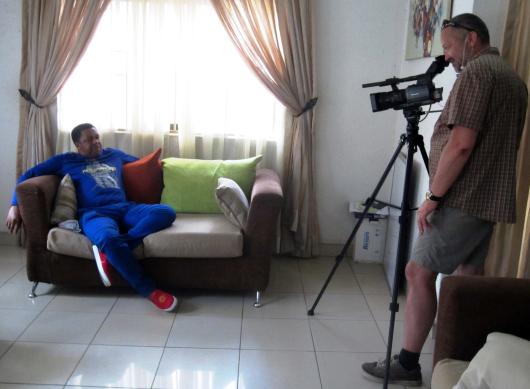
Meeting with Francis Duru – the star of Nollywood
18.08.2015 / 10:15 | Aktualizováno: 17.08.2015 / 20:03
A well-known Nollywood actor Francis Duru gave an interview for Czech Television at a meeting with the Ambassador Pavel Mikeš August 6, 2015. Apart from the traditional topics concerning the film, the talk turned on important social issues too.
Besides Hollywood the Indian film industry known as Bollywood has been integrated into Czech public awareness in recent years. The Nigerian cinematography, Nollywood, has its headquarters in Lagos. It holds, just behind India and ahead of Hollywood, the second place in the ranking of the world's largest film producers, but it still remains a bit aside of the interest of the Czech viewer.
On Thursday, August 6, the staff of the Czech Embassy, Ambassador Pavel Mikeš and cultural attaché Marie Novotná, met the one of the stars of the Nollywood industry. The actor, director, producer and singer Francis Duru also gave the interview to a Czech national TV for a documentary called “On the way” during the meeting. Within the more than the hour long talk Mr. Duru spoke not only about the film, Nollywood and his faith in God, but also about the burning contemporary issues such as Boko Haram or rebels protesting against oil companies in the river delta of Niger. Open debate brought many interesting impulses to the representatives of the Czech Embassy.
Francis Duru studied acting at the University of Port Harcourt in Rivers State and he debuted on a movie set in 1989 in the film Missing Mask. He caught in fact the real start of the rise of Nigerian cinematography. Although the Nollywood filmmakers started shooting shortly after the country became independent in the 60s, a television production prevailed initially because of financial reasons; the Nigerian film’s real boom began in the 90s. Francis created dozens of films, from the best known for example Mama Sunday, Blood Money or the movie Nnenda. In the last named he played a supporting role which brought a nomination for the Award of the African Film Academy to him in 2010.
Nigerian movies are usually filmed in a studio. Thematically, they deal with the problems of everyday life of the population. Part of the production is focused on presenting the various ethnic groups in Nigeria; the television channels then broadcast them in the most widely used local languages: Hausa, Yoruba and Ibo. A very widespread broadcast language is also Nigerian Pidgin (or just Pidgin). The term pidgin usually refers to a language, resulting from a contact between two or more languages, which has no native speakers. But in the Nigerian case this is no longer true. The Nigerian Pidgin – emerged from the connection of English and languages of the Gulf of Guinea - has already become a national mean of communication with its own native speakers. In spite of that, its bearers still call it pidgin. The language also has much in common with the English, which is spoken in the Caribbean, especially in Jamaica.
Nollywood production is continuously broadcasted by dozens of local channels, but its purview doesn't end in Nigeria - without exaggeration all Africa is watching Nollywood and moreover a numerous African diaspora around the world. If the Czech viewer watched some of the Nollywood films, besides extraordinary cinematic experience, he would also have an opportunity to gain a certain awareness of the interesting facts about Nigeria.

















